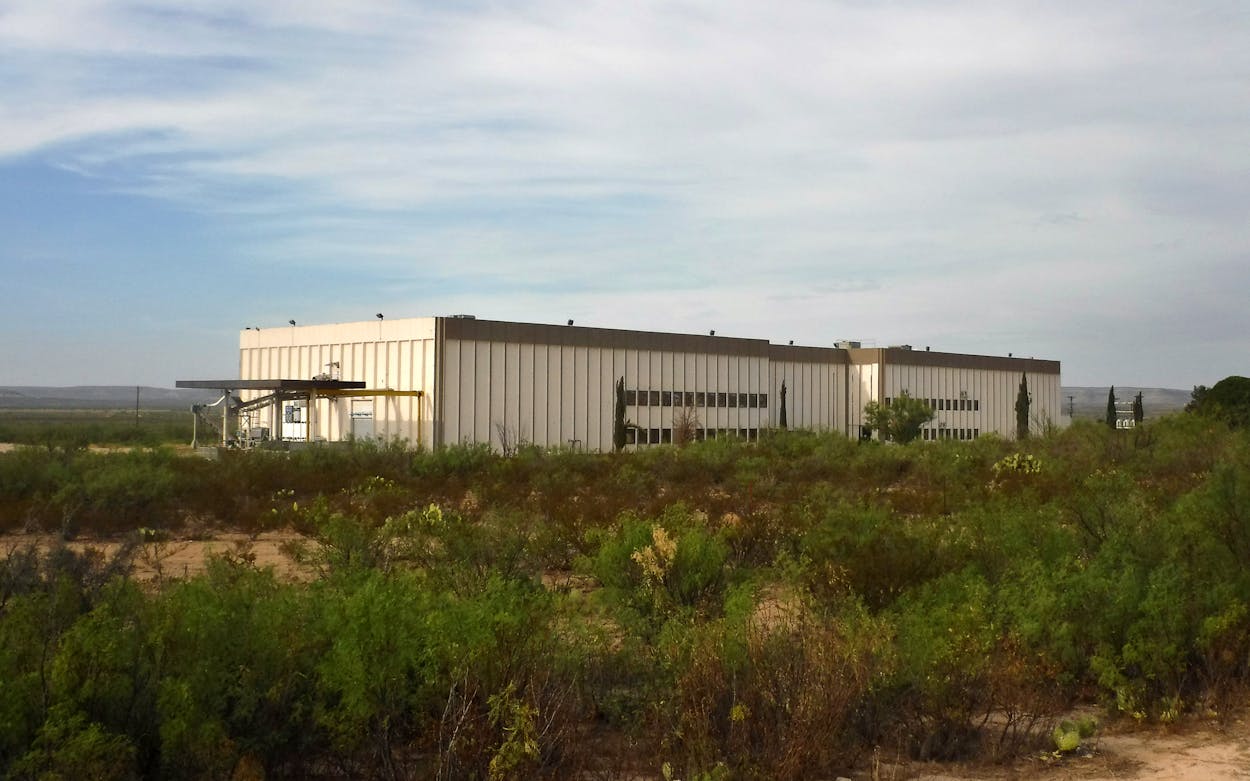To travelers barreling down Interstate 10 at 80 miles per hour, Fort Stockton is mainly a place to stop for gas and a quick bite to eat. Only the trained eye would catch an unassuming structure about 25 miles east of town that was once home to Ste. Genevieve Winery.
Built between 1981 and 1984 on 1,300 acres owned by the University of Texas, Ste. Genevieve was a forerunner of the now-touted Texas wine industry. At one point it was the largest winery in the entire Lone Star State, so massive that it bottled wines for other small wineries and supplied many East Coast restaurants with their “house” wines.
But on August 10, an online auction was held to liquidate all the fermentation tanks, winepresses, and bottling machinery to satisfy a bankruptcy filing.
It’s a sad end for the pioneering winery, especially as Texas wine is more popular than ever—the state has one of the largest wine regions in the U.S. The closing has affected partner wineries in Texas, as well as the small community of Fort Stockton.
Ste. Genevieve began nearly thirty years ago with an unlikely partnership between the University of Texas and a group of French and American companies that saw opportunity in the Trans-Pecos.
The University of Texas owns 2.1 million acres of land across nineteen counties in West Texas. About 190,863 acres are in Pecos County. The university’s first holdings were acquired in 1839 at the urging of President Mirabeau Lamar when the Republic of Texas Congress set aside 220,000 acres for the endowment of a yet-to-be-established university. In 1876, another million acres was added, then a million more in 1883, for the Permanent University Fund (PUF). Several thousand acres have been leased to cattle ranchers, while the mineral rights deliver a steady flow of cash to the PUF to finance higher education in Texas.
In 1981, in a move to diversify its income streams, UT partnered with the noted French winery Domaine Cordier to plant the vines and construct a state-of-the-art winery in Pecos County. To oversee the operation, the university brought in a group of French vintners who relocated from the Bordeaux area to Fort Stockton.
They planted sauvignon blanc, cabernet sauvignon, and chardonnay grapes, varieties they thought would flourish in the Trans-Pecos when watered by a drip irrigation system. It wasn’t that far-fetched of an idea. Grapes were grown in Pecos County nearly a hundred years earlier, when vineyards were watered by irrigation canals from Comanche Springs.
So, led by the French, on UT land, a vineyard sprouted in the Chihuahuan Desert and grew to more than one thousand acres.
In pursuit of quality, Domaine Cordier insisted on only the best in every facet of the operation, according to Jean-Michel Duforat, a former employee of the winery who gave a presentation about St. Genevieve’s history to the Fort Stockton Rotary Club in June. No expense was spared. Even the tile floors were imported from France. While many of the grapes were pressed in stainless-steel “crush pads,” Ste. Genevieve also employed rotary presses, which don’t “push the grapes” as bladder presses do, but use the weight of the grapes falling on the sides to extract the juices delicately without a lot of tannins.
In 2005, the winery was purchased by Mesa Vineyards. Eventually, a series of events, including a late-April freeze in 2014 that wiped out the entire grape harvest for that season and the closures of restaurants the winery worked with due to COVID-19, led to hard times.
In January 2022, Mesa Vineyards filed for bankruptcy. The winery, once valued at more than $9 million, was purchased for $1.4 million by a liquidation company. Like many private equity firms, it moved quickly to break apart the assets and sell them off one at a time. The August 10 auction disposed of the stainless-steel vats, the bottling line, the presses, and even the tables and benches. To add insult to injury, the auction took place online. You didn’t even have to be at the winery to place a bid.
“It is sad to have experienced the decline of the brand,” said Bénédicte Rhyne, Ste. Genevieve’s winemaker from 2003 to 2019 and the current winemaker of Kuhlman Cellars in Stonewall. “I think the winery helped put Texas on the map. For myself, I feel extremely proud that I contributed my knowledge and experience to the winery as the winemaker for sixteen years. I enjoyed working with the team, and when I left, it was a bittersweet moment, as I could see the writing on the wall.”
Businesses fail every day, but for many Fort Stockton residents, the demise of Ste. Genevieve hurts. It gave the town a certain cachet in a region known more for fracking and cattle ranching. The Fort Stockton Chamber of Commerce even used to lead tours of the winery in a Roadrunner bus.
“Ste. Genevieve was a stable business in Pecos County that contributed to the economy for many years,” Pecos County Judge Joe Shuster said. “I am in hopes that some other group will come in to reopen it.”
That may be a tough sell, because the vineyard hasn’t been tended or watered since the bankruptcy. The only remnant of what was once a proud winery is its former tasting room, the Grey Mule Saloon, located in downtown Fort Stockton. After the bankruptcy filing, the City of Fort Stockton took back the building. It has now reopened as the Grey Mule Wine Saloon, with Duforat operating it. You’ll find several wines available there, but only a handful of Ste. Genevieve wines remain.
- More About:
- Libations
- Business
- Wine
- Fort Stockton






